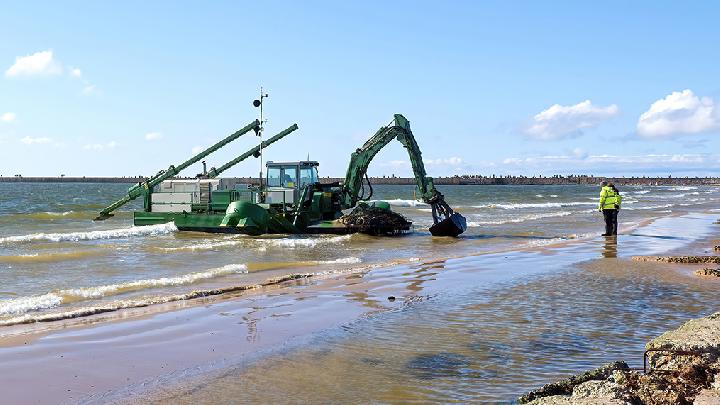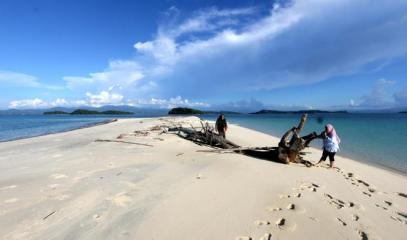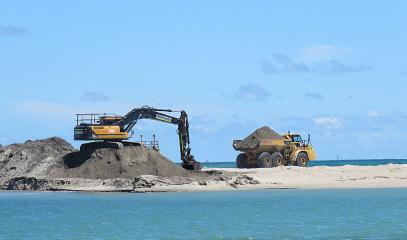Environmentalists slam Widodo for lifting ban on ocean sand exports
The outgoing president has lifted a ban that had been in place for more than 20 years and was introduced to protect the ecosystem and the land. In justifying the decision, he speaks of a ‘correction’ to the previous rule: it would not be sand, but ‘ocean sediments’. Former fisheries minister Susi Pudjiastuti expresses her ‘deep concern’.
Jakarta (AsiaNews) - Environmentalists and broad sectors of Indonesian civil society have welcomed with shock and disapproval the decision by outgoing President Joko ‘Jokowi’ Widodo, whose term expires on 20 October, to lift the ban on the export of ocean sand, used mainly in the construction industry.
The ban was introduced more than 20 years ago and was necessary for environmental and security reasons, to protect the national heritage. Despite this, the Head of State decreed its cancellation on 9 September, depriving the archipelago of one of the key regulatory resources for protecting its maritime resources and safeguarding its ecosystem.
The ban on the export of ocean sand was introduced in 2003, under the presidency of Megawati Sukarnoputri. This decision was based primarily on environmental and ecological concerns, although at the time Jakarta was a major player in the market for material destined for Singapore.
Among the concerns was the fact that without this natural protection, the coastline would be more prone to flooding and inundation, especially the smaller islands of the archipelago.
In 2010, during a confidential interview with AsiaNews, a major sand exporter identified by the initial J. said he was ‘deeply saddened’ by the damage caused to the environment and the ocean ‘because of the sand dumps used for export’. A trade that, in return for the revenue, was causing a significant impact on ecology and sustainable development.
The decision to lift the ban was taken by President Widodo following a draft revision prepared by Trade Minister Zulkifli Hasan, who made a ‘correction’ related to terminology. In fact, it was not ocean sand, but ‘ocean sediment’.
The move was made by the outgoing president after he issued a new regulation in May 2023 authorising mining companies to explore for ocean sand and export it, with the only condition and requirement being that domestic needs were ‘already covered’. The new regulation approved by the head of state will enter into force 30 days after its publication.
In response, a broad sector of society and environmental movements have launched a protest that has been relayed on social networks. Former fisheries minister Susi Pudjiastuti is one of the most well-known figures in Indonesia campaigning against the lifting of the ban and has repeatedly expressed her ‘deep concern’ over the issue in recent days.
Pudjiastuti argues that this new regulation will only endanger the maritime environment: ‘If they want to export ocean sands or sediments, it is better - she warns in a note published on X, formerly Twitter, on 19 September - to take advantage of the seabed in the northern coastal region of Java, so that it will not be affected by tides due to excessive abrasion)’.
The former fisheries minister's strong and determined message won the support of most environmentalists, who argued that the export of sand or sediment to Singapore will soon create environmental and safety problems such as the following, for three reasons in particular Indonesian fishermen will face technical challenges and difficulties in fishing, as the fish habitat has already been wiped out; environmental problems will arise, as coral reefs could be severely damaged; and there will be security problems, as Singapore's hinterland will be further ‘enlarged’ to the south, with the shrinking of the Indonesian counterpart.
In a report, Greenpeace Indonesia says the new regulations will lead the country to commit ‘ecological sins’ attributable to the outgoing administration, and the first victims will be local fishermen.
Most environmentalists and politicians opposed to Jokowi claim that the recent decision will only encourage uncontrolled exploitation of the country's maritime heritage and cause negative social impacts, despite Jokowi's recent claims that what is being exported is not sea sand, but its sedimentation.









.png)










